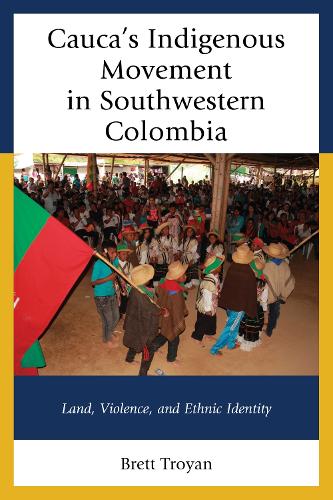
Cauca's Indigenous Movement in Southwestern Colombia: Land, Violence, and Ethnic Identity
(Hardback)
Publishing Details
Cauca's Indigenous Movement in Southwestern Colombia: Land, Violence, and Ethnic Identity
By (Author) Brett Troyan
Bloomsbury Publishing PLC
Lexington Books
10th June 2015
United States
Classifications
Tertiary Education
Non Fiction
Revolutionary groups and movements
Human rights, civil rights
305.80098615
Physical Properties
Hardback
220
Width 161mm, Height 236mm, Spine 20mm
449g
Description
Cauca's Indigenous Movement in Southwestern Colombia: Land, Violence, and Ethnic Identity provides a vivid account of how the indigenous communities of Cauca in southwestern Colombia engaged with the Colombian central state. Troyan begins with the question of how 3.4 percent of the Colombian population obtained legal rights to close to a quarter of the national territory. Her in-depth study of the correspondence between the central state and indigenous communities of Cauca reveals that the nation state played a key role in the legitimization of land claims based on ethnic identity. Starting with the indigenous movement led by Manuel Quintn Lame in 1914, this book shows how, in contrast to the local authorities of Cauca, the central state adopted a more sympathetic albeit contradictory approach to indigenous communities grievances throughout the twentieth century. Land, Violence, and Cauca's Indigenous Movement in Southwestern Colombia presents an examination of state initiatives in the 1930s, 1950s, 1960s, and 1970s toward indigenous communities in Cauca, which sheds light on the political and social construction of Colombian indigenous identity. Troyan also reveals how violence and the representation of violence shaped the conversations between the central state and indigenous communities of Cauca; the central states inability to exert a monopoly on violence, Troyan argues, places indigenous communities and their leaders in jeopardy despite the discursive legitimization of land claims based on ethnic identity.
Reviews
Brett Troyan has produced a thoughtful and persuasively argued history of Cauca and of the emergence of a movement for indigenous self-determination in that Colombian department. The book provides a carefully detailed political history of what became one of the Americas important indigenous-led movements. . . .[S]pecialists will be grateful to Troyan for the seriousness with which she proceeds. Historians, in particular, are likely to feel that this is that rare book that would have been improved by being longer. . . .Troyans research will be a necessary starting point for those hoping to understand the history of indigenous politics. New generations of scholars will benefit from her footnotesand they will especially appreciate her thorough bibliography. . . .Colombianists and Latin Americanists in general are in debt to the step forward offered by Troyans book. * Hispanic American Historical Review *
Cauca in southwestern Colombia is home to some of the most fascinating and important twentieth-century Indigenous organizing efforts in Latin America. Most notably, Manuel Quintn Lame who emerged as a key leader in Cauca used his literacy skills to petition the government for the rights of Indigenous peoples. As historian Brett Troyan aptly demonstrates in this important book, Quintn Lame as well as other leaders such as Gregorio Hernndez de Alba and Juan Palechor did not operate in a political vacuum. Troyan draws on extensive archival documentation to illustrate how Indigenous leaders negotiated with dominant political parties and armed guerrillas groups. Rather than presenting Indigenous peoples as hapless victims of larger political forces, Troyan forcefully underscores their agency in defining and directing the concerns of marginalized communities. She offers a carefully documented and very insightful analysis of how across the twentieth century local Indigenous leaders repeatedly challenged the Colombian central governments discourse on citizenship and ethnicity. The result is a compelling book that will be of fundamental interest to scholars wishing to gain a deeper understanding of the political constructions of ethic identities. -- Marc Becker, Truman State University
Although studies of indigenous organizing in Latin America have expanded our understanding of contemporary social movements, this worklargely written by anthropologists, political scientists, and sociologistshas remained, with only a few exceptions, untethered from its historical context, as though the robust indigenous presence in the modern political scene emerged out of thin air. If we are to comprehend how and why ethnic rights have become such a central concern today, even in countries like Colombia, with tiny indigenous populations, we must look to the past: to how indigenous communities forged innovative strategies for voicing their demands to the state during a period in which Latin American nations imagined themselves as homogeneous, before constitutional reform recast the nation as pluriethnic. Caucas Indigenous Movement provides readers with this much-needed historical depth by focusing on the twentieth-century antecedents to the Regional Indigenous Council of Cauca (CRIC), Colombias first modern indigenous organization. Brett Troyan draws on rich and until now neglected archival evidence to highlight the complexities of early indigenous organizing: the heterogeneity of indigenous political strategies over time, the intensity of internal conflicts over their implementation, the changing response of the Colombian national state and regional government to indigenous activism. In doing this, she provides readers with a welcome corrective to our insistence on dwelling exclusively on activism in the present, as well as new ways of situating that present in a complex past. -- Joanne Rappaport, Georgetown University
Brett Troyans Cauca's Indigenous Movement in Southwestern Colombia is a seminal work for understanding twentieth-century indigenous politics. Troyan expertly explores the relation between indigenous actors and the Colombian state, creating a powerful study in state building and community formation from above and below. Troyans work also helps us understand the intense resonance and meaning discourses of indigenous citizenship exercised both in the Colombian past and its present. -- James E. Sanders, Utah State University
Author Bio
Brett Troyan is associate professor of history at Cortland College, State University of New York.
